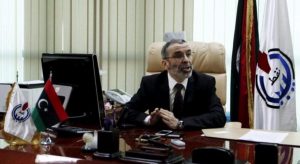By Libya Herald reporters.

Tunis, 19 June 2017:
The National Oil Corporation (NOC) is arguably the only Libyan institution still able to function across the whole country and as such its integrity should be protected, its chairman Mustafa Sanalla said today.
He has used an op-ed article in the New York Times to argue that the organisation should remain independent, not be split up and must retain its monopoly on oil and gas exports. Sanalla also continued to insist that NOC must remain above politics.
He noted: “For years now, opportunists of all stripes, local and international, have tried to profit from Libya’s seemingly endless instability by disrupting its oil production”.
The latest example he said had been triggered by the sudden souring of relations between Qatar and Saudi Arabia, the UAE, Egypt and Bahrain.
He then launched an attack on Abdullah Thinni’s Beida government.
“One of the several groups that purport to be Libya’s rightful government is using that dispute as a pretext to seize control of the country’s oil and gas exports. It has accused the National Oil Corporation, the internationally-recognised body responsible for managing these resources, of working in the service of Qatar by diverting oil revenues to it via a NOC customer.”
Sanalla continued: “I am NOC’s chairman and these allegations are false. But they shine a bright light on Libya’s current tragedy. Since the revolution of 2011, the country’s oil and gas resources have been held hostage to both its fractious politics and power struggles in the Middle East.”
But Sanalla also rounded on the Presidency Council (PC). “This spring the United Nations-backed Presidency Council, which oversees the Government of National Accord, issued a decree transferring to itself the NOC’s most important functions, such as the right to negotiate concession agreements with foreign companies or set the sale price of Libya’s oil. The move was blocked by an appeals court in Benghazi, but we cannot discount the possibility of similar attempts in the future.”
The NOC chief suggested that the Libyan Political Agreement (LPA) should be revised to reinforce the corporation’s authority and neutrality. He also proposed that the mandate of the EU’s anti-smuggling Operation Sophia should cover not only arms and migrants but also oil smuggling, liaising with NOC to interdict rogue tankers.
He said that NOC’s technocrat board should be insulated from arbitrary changes. Its budget for investment and maintenance should be guaranteed. It should be given the power to negotiate new foreign investments.
Sanalla also insisted that the corporation should operate with the highest degree of transparency. “I am happy to open our books to scrutiny. The Central Bank and Ministry of Finance should also make public their expenditures, since it is they, not NOC, that control Libya’s oil revenues and distribute them — or not — according to a controversial interim budget produced by the Government of National Accord. All this money ultimately belongs to the Libyan people, and they have the right to know how it is spent.”
Sanalla predicted that oil production would very soon reach a million barrels per day for the first time since 2013.
“Ring-fencing Libya’s oil sector from local and international rivalries would have an enormous impact on the country’s prospects, both economic and political” he said, “It would de-escalate the current internal conflict. It would unlock the potential of oil as a driver of national regeneration. It would, in short, allow the country’s resources to be put to work for their rightful beneficiaries: the people of Libya.”






